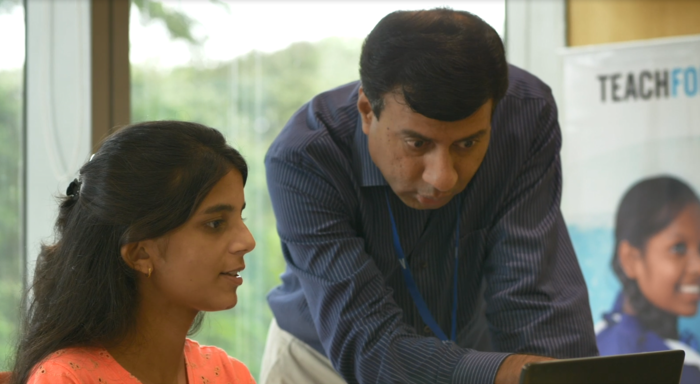Expose
The 'Expose' pillar provides youth with first insights into the world of work. Activities such as workplace visits, career fair and career talks allow children and youth to obtain information about the professional work environment and provide an insight into career opportunities and apprenticeships.

Activities
Workplace visits
Youth may visit a local site or office for a few hours to experience different places of employment. This gives them the opportunity to see first-hand where and how employees perform tasks, jobs and projects. Finally, they have the chance to ask their questions to DPDHL employees during a career Q&A.
Career fair
During career fairs, stands are set up and each department informs about the variety of professional opportunities, as well as employees share their own work experience with youth.
Career talk
During career talks, employees talk about their occupations and how they got to their position. They may also touch upon topics such as gender stereotypes in the workplace or the future of work.
Recommendations for successful 'Explore' activities
- Willingness to volunteer - Mentee and mentor take part in the program voluntarily and recognize the personal benefit / value for both sides of the tandem
- Independence - There is no relationship of dependency between mentee and mentor, i.e. no direct or indirect employment or care relationship
- Defined period - The mentoring relationship exists for a defined period of time, but can also be continued informally beyond that time.
- Personal contact - Getting to know each other personally is of great importance for the success of the mentoring relationship. The meetings can be supplemented by e-mail correspondence, telephone calls or, if necessary, Skype contacts, etc.
- Confidentiality - The mentoring discussions take place in a protected environment and are to be treated as strictly confidential by the participants.
- Commitment -The binding and reliable handling of appointments and agreements is an essential basic requirement for a successful mentoring relationship.
- Expectations and agreement - At the beginning of the mentoring partnership, the conditions of the cooperation (e.g. contact, feedback, confidentiality) between mentor and mentee should be clarified, and the expectations and role concepts should be clearly communicated. Personal goals for the mentoring period and possible topics and issues should be discussed.
- Mentoring as a process - Mentoring should be viewed as a process. Mutual openness is necessary for the development of plans or solutions during the mentoring process. In some cases the process may not reach a conclusion per se but the honinig of individual perspectives or the development of a strategy to enable an individual to embark on subsequent steps are also valuable results.
Content of a 'Explore' activity
The range of topics that can be covered within the 'Explore' pillars are diverse. Mentors bring with then varied experience and knowledge and provide valuable individual support. Possible topics include:
- Definition of goals and development of individual strategies; joint development of objectives (short, medium and long-term) including the necessary steps and implementation or solution strategies; development of personal competencies; reflection on and development of personal competencies, e.g. by means of a location analysis, potential analysis and strengths/weaknesses analysis, and, if necessary, a diversity dimension analysis; transfer of informal knowledge bases; transfer of informal knowledge by "showing mentees the ropes" in the desired field of activity.
- Networking - Practical tips to help establish and maintain networks that can be professionally or personally benefitial.
- Choice of profession - What aspirations does the mentee have? Develop realistic scenarios with alternative options. What paths are open to help the mentee work towards their goal? Work together to develop strategies to realize their objectives.
- Career entry - When starting their careers, mentees find themselves at an important crossroads in their lives, facing important questions about career orientation and possible career paths as well as application strategies. In order to make well-balanced, confident decisions on future careers, it is important to develop a sound knowledge base. This can be done with the help of the mentor's experience and discussed together. An important prerequisite for this process is having a mentor who is sensitive towards the topics of equal opportunities and social integration.
- Application - What does a proper application look like? How todo you successfully pass an application interview? What do you need to know about an entrance test? What types of application process exist? Mentors can share tips on practical procedures, practise interview situations and share personal or network information.
- Integration - Support in developing language skills. Access to "other" social groups and thus to other life worlds. Analysis of possible offers of help that can be taken advantage of. Assistance with authorities.
- School leaving certificate - Analysis of the possibilities: which degree > which profession. What support is needed to achieve the desired degree.
Mentoring offers access to role models for young people. In addition to professional exposure and professional experiences, it fosters personal development, trust, self-esteem, and leadership skills. The content of the sessions, as well as the duration, are defined between partners on the ground according to the needs of the young people.
Good Practices
The Good Practice Examples chapter of this Wiki provides insights into different real-life examples all around the globe.
| Chapter lead | Susanne Novotny |
|---|